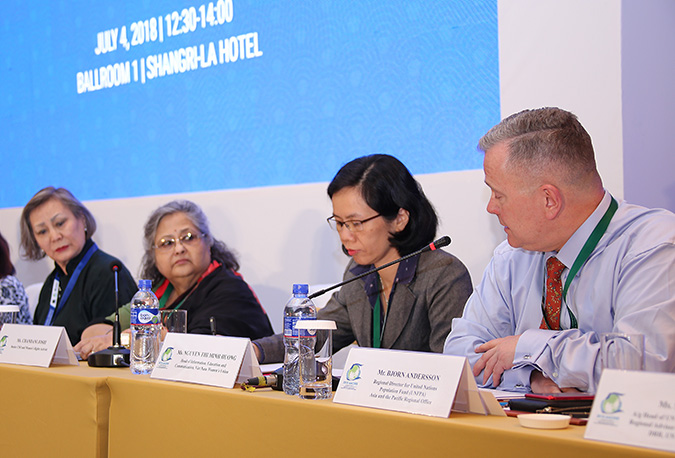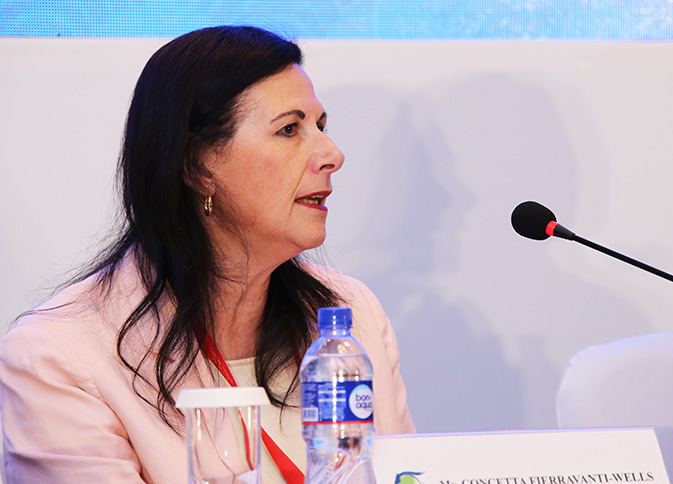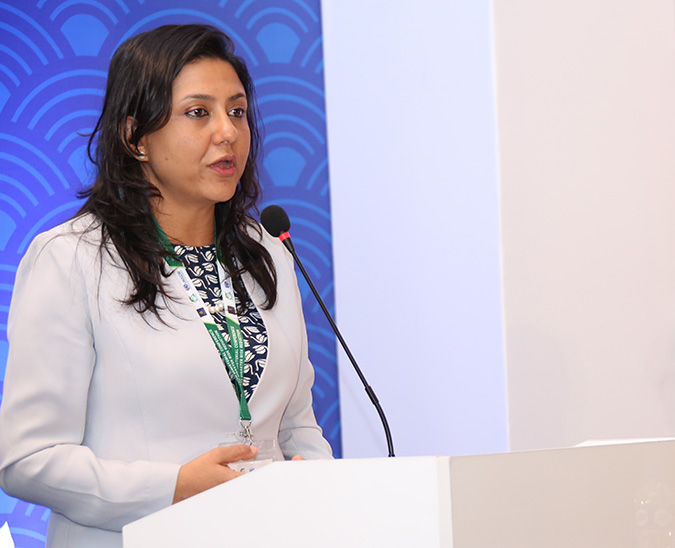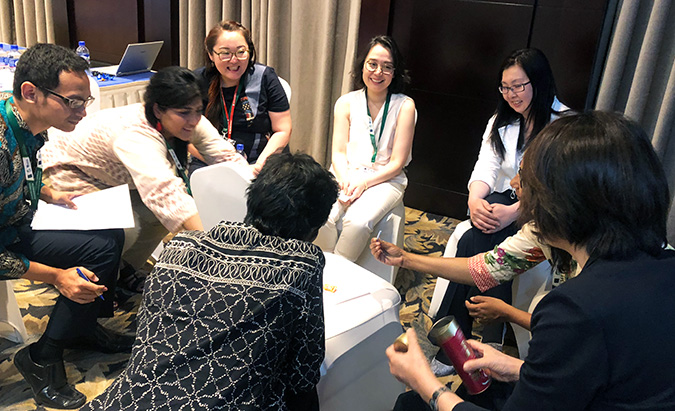Asian ministerial conference pledges greater efforts to empower women in reducing disaster risk
Date:
Author: Devikara Devakula
Ulaanbaatar, Mongolia — More than 50 countries have pledged to give more women leading roles in efforts to reduce the high risks they face from natural disasters in Asia.

The 2018 Asian Ministerial Conference for Disaster Risk Reduction, held in Mongolia’s capital on 3-6 July, made this and other key commitments by adopting the Ulaanbaatar Declaration and the Action Plan 2018-2020 of the Asia Regional Plan for Implementation of the Sendai Framework for Disaster Risk Reduction 2015-2030. They also agreed to promote gender-sensitive disaster risk reduction (DRR) by improving collection of disaggregated data on sex, age and disability, and meeting the specific needs of women and girls in programmes to stem gender-based violence and to ensure sexual and reproductive health.
The Sendai Framework is a global plan adopted by United Nations Member States in 2015. In 2017, disasters in Asia killed more than 6,500 people and affected 66.7 million, says the United Nations Office for Disaster Risk Reduction. Women and girls are disproportionately vulnerable; at the same time, they play critical roles in prevention, response and recovery.
In the Ulaanbaatar Declaration, the countries pledged to “promote full and equal participation of women in leading, designing, and implementing gender-sensitive disaster risk reduction policies, plans and programmes, through joint efforts by public and private sector, supported by appropriate legal frameworks and allocation of necessary resources”.
Leading up to and at the Asian Ministerial Conference, UN Women joined a wide range of civil society and non-governmental organizations and United Nations agencies in the ISDR Asia Partnership Gender Stakeholder Group to advocate for the key outcomes, including at a plenary event on gender and inclusiveness.
“After the 2015 Nepal earthquakes, we saw extraordinary resilience from women, who made commitments not just to rebuild their homes, but to rebuild their communities and their nations,” Chandni Joshi, Chair of the Women Friendly Disaster Management Network in Nepal, said at the conference. “Yet patriarchal mindsets and protectionist views reign large, women continue to lack access to information on disaster risk reduction actions, and women in leadership in DRR remain invisible.”

Senator Concetta Fierravanti-Wells, Australian Minister for International Development and the Pacific, said: “Women, girls, and persons with disabilities have a fundamental right to contribute to the decisions that affect their lives and their communities. They bring vital skills, knowledge, and resilience, but continue to be underrepresented in positions of leadership. We do not need to make decisions on behalf of this group. We need to trust them, we need to respect them, and most of all we need to empower them.”

Smriti Aryal, Acting Head of UN Women Myanmar and Regional Advisor for Humanitarian Action and disaster risk reduction, called for concrete action on women’s leadership while presenting the results of a progress review done by UN Women, Duryog Nivaran and the Asia Disaster Preparedness Centre on behalf of the Gender Stakeholder Group.
“To increase women’s leadership and participation in DRR policy and actions, we must establish or strengthen institutional mchanisms and platforms, ensure a minimum of 30 per cent women in DRR decision-making roles, and invest in developing women’s leadership capabilities and skills as part of strengthening risk governance,” she said. “We cannot afford lip service any more -- we must engage women, be inclusive, and protect rights for all.”
Bjorn Andersson, Regional Director for Asia and the Pacific of United Nations Population Fund (UNFPA), said strengthened disaggregated data are needed for taking evidence-based actions, especially in humanitarian and fragile situations where 60 per cent of preventable maternal deaths occur.
In a joint United Nations statement made at the conference, Tiziana Bonapace, Director of ICT and Disaster Risk Reduction at United Nations Economic and Social Council for Asia and the Pacific, said: “We will further strengthen the emphasis on enhancing capacities, strengthening livelihood and resilience of those who are most marginalized -- the poor, women, children and those living with disability -- which is critical to reducing disaster risks, reducing poverty, strengthening health systems and promoting gender and social equality.”

As a key step towards realizing commitments made at the conference, Senator Fierravanti-Wells announced her country’s support for a three-year rollout of Gender Inequality of Risk in the Solomon Islands, a joint flagship programme of UN Women, United Nations Office for Dissaster Risk Reduction, and International Federation of Red Cross and Red Crescent Societies. Speaking on the importance of building community resilience and reducing the gender inequality of risk, she said: “The more inclusive our approach, the stronger, fairer, and more resilient our communities will be. The challenges of ensuring commitments to gender-sensitive disaster risk reduction are great, but if we can overcome these challenges, we know we can together change and save so many lives.”
For more information, please contact:
Devikara Devakula
Programme Analyst, Humanitarian Action and Disaster Risk Reduction
UN Women Regional Office for Asia and the Pacific
Email: devikara.devakula@unwomen.org